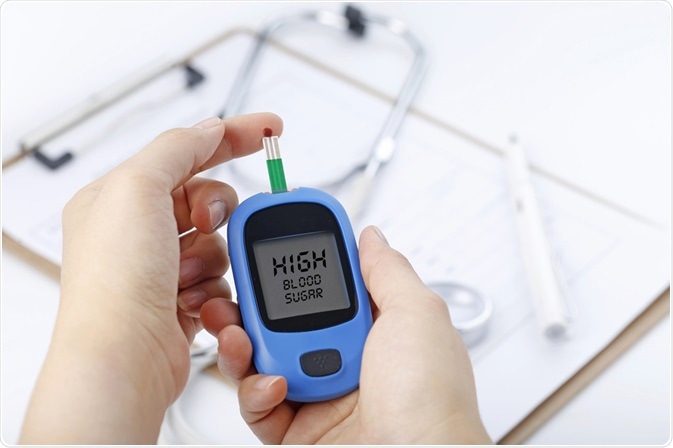High blood sugar, also called hyperglycemia, is a medical terminology to define significantly high glucose levels in the blood because of impaired glucose metabolism. A fasting blood glucose level of more than 125 mg/dl and a postprandial blood glucose level of more than 180 mg/dl is regarded as high blood sugar.

Image Credit: Jinning Li/Shutterstock.com
What is high blood sugar?
High blood sugar occurs when the pancreatic beta cells cannot produce sufficient insulin (a hormone that promotes the uptake of glucose from the blood into cells), or the body cannot utilize insulin effectively. These collectively leads to reduced cellular glucose metabolism and increased blood glucose level.
People with diabetes are affected by high blood sugar. In type 1 diabetes, the blood sugar level rises because the pancreas cannot produce insulin. Whereas, type 2 diabetes develops because of increased insulin resistance or insufficient insulin production.
There are several etiological factors for high blood sugar. Damage of the pancreas because of certain diseases, such as chronic pancreatitis, pancreatic cancer, and cystic fibrosis, can lead to reduced insulin production.
Similarly, diseases like acromegaly and Cushing syndrome can increase the blood sugar level by causing peripheral insulin resistance. Certain medicines, such as glucocorticoids, estrogens, and diuretics, can also cause high blood sugar.
Certain lifestyle conditions, such as physical inactivity or high intake of carbohydrate-rich foods/drinks, can cause high blood sugar. Also, physical stress due to illness or emotional stress due to personal or family conflicts or education-related problems can trigger the condition.
Dawn phenomenon, which is defined as an early morning rise in blood glucose level due to a surge of hormones, is another potential cause of high blood sugar.
What are the risk factors for high blood sugar?
A family history of type 2 diabetes is the major risk factor for high blood sugar. Obese people and people with high blood pressure or cholesterol are at higher risk of having high blood sugar. Women with polycystic ovarian syndrome are also at higher risk.
Certain races, including African American, Native American, Hispanic, and Asian American, are prone to developing high blood sugar.
Gestational diabetes is a type of diabetes that occurs in about 4% of pregnant women. It occurs because of reduced insulin sensitivity in the body. Women with a history of gestational diabetes are more susceptible to have high blood sugar later in life.
What are the symptoms of high blood sugar?
The symptoms of high blood sugar develop slowly over time. The symptoms become severe if the blood glucose level remains high for a prolonged period.
The initial signs and symptoms of high blood sugar include high glucose levels in the blood and urine, frequent urination, increased thirst, headache, fatigue, weight loss, slow wound healing, vaginal or skin infection, and blurred vision.
If left untreated, high blood sugar can lead to the accumulation of ketones (toxic acids) in the blood and urine. This condition is termed as ketoacidosis. The signs and symptoms of ketoacidosis include nausea, vomiting, breathlessness, increased heart rate, fruity-smelling breath, abdominal pain, dehydration, confusion, and coma.
How to detect high blood sugar?
The blood sugar level can be easily determined by adding a drop of blood from the fingertip to a chemically treated strip, which is subsequently inserted into an automatic blood sugar monitor to take the reading.
Tests to detect ketones in the urine are recommended for people who have a blood sugar level of 240 mg/dl or more. people with positive urine ketone test results should be immediately treated with blood-sugar-lowering medicines.
Another important test to track the blood sugar status is the hemoglobin A1C test. This test measures the percentage of sugar attached to hemoglobin in the blood, and the test results indicate an average blood sugar level for the last 2 – 3 months. A hemoglobin A1C test result of more than 7% indicates that the blood sugar level is not under control.
How to manage high blood sugar?
To reduce the risk of developing serious complications, it is important to keep the blood sugar level under control. Diabetic people with persistently high blood sugar levels should take sugar-lowering medicines exactly as directed by the physician. Non-adherence to anti-diabetic medications can have fatal consequences.
It is also important to follow a healthy lifestyle. A balanced diet together with regular physical activity is the key to manage high blood sugar. People with high blood sugar should check the sugar level daily. Based on the daily record of blood sugar levels, doctors may change the doses or timing of insulin or other sugar-lowering medicines.

Image Credit: Evan Lorne/Shutterstock.com
Last Updated: Oct 22, 2020